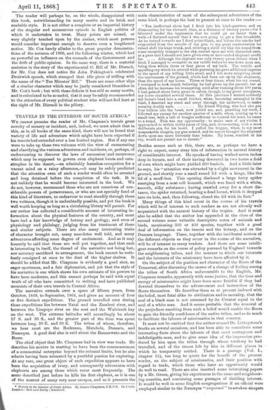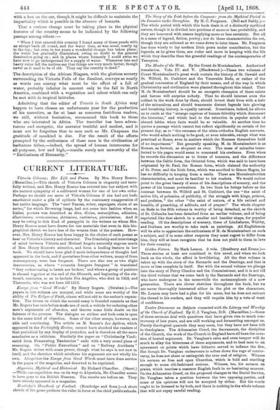TRAVELS IN THE INTERIOR OF SOUTH AFRICA.. WE cannot promise
the reader of Mr. Chapman's travels great novelty of scenery or incident, and, indeed, we must admit that in this, as in all books of the same kind, there will not be found that variety of life and adventure which might have been expected if his travels had extended over a less limited region. But if any one were to take up these two volumes with the view of enumerating and classifying the various adventures and incidents, or, perhaps, of endeavouring to discover the laws of succession:and recurrence which may be supposed to govern even elephant hunts and cata- strophes in the desert,—an admirably harmless occupation for a vacant mind on a rainy afternoon,—it may be safely predicted that the attention even of such a reader would often be arrested and long detained before the completion of the task. It is not unlikely that he would become interested in the book. We do not, however, recommend those who are not conscious of con- siderable powers of perseverance, or who are not specially fond of this kind of literature, to endeavour to read steadily through these two volumes, though it is undoubtedly possible, and yet the book is well worth keeping as long as a circulating library will permit. For our author has collected a considerable amount of interesting in- formation about the physical features of the country, and must have had a fair knowledge of botany and geology, and even of physiology and philology, judging from his treatment of these and similar subjects. There are also many interesting traits of character brought out, many anecdotes well told, and many adventures affording some degree of excitement. And as it may honestly be said that these are well put together, and that each is interesting in itself, the thread of the narrative not being lost, nor accuracy sacrificed to arrangement, the book cannot be ruth- lessly consigned at once to the dust of the higher shelves. It should be added that Mr. Chapman is evidently a good shot, an eager sportsman, and a fair diplomatist, and yet that the style of his narrative is one which shows his own estimate of his powers to have been moderate, and this cannot perhaps be said with equal truth of all who have committed to writing and have published accounts of their own travels in Central Africa.
The narrative extends over a space of fifteen years, from October, 1849, to September, 1864, and gives an account of four or five distinct expeditions. The ground travelled over during those expeditions lies between Natal and the Zambesi river, and between the Limpopo river on the east and the Walvirsch bay on the west. The extreme latitudes will accordingly be about 17 S. and 30 S., and the greater part of the time was spent between long. 20 E. and 30 E. The tribes of whom, therefore, we hear most are the Bechuana, Matebele, Damara, and Namaqua. A good deal also is said about the Bamanwato and the Boers.
The chief object that Mr. Chapman had in view was trade, lie describes his motive in starting to have been the commencement of a commercial enterprise beyond the colonial limits, but he also admits having been animated by a youthful passion for exploring. At any rate, one great object of each expedition appears to have been the acquisition of ivory, and consequently adventures with elephants are among those which recur most frequently. The scene described just before he kills his first elephant, as it is one of the nearest of many very near escapes, and as it presents the
• Travels in the Interior of South Africa. By James Chapman, F.R.G.S. In 2 vole. London: Bell and Daldy; Stanford. main characteristics of most of the subsequent adventures of the same kind, is perhaps the best to present at once to the reader :— " Ten ineffectual shots had I fired into his bind-quarters, and on dismounting for the eleventh time, at a distance of twenty paces—for I laboured under the impression that he could go no faster than a walk—I flattered myself that I was now going to get a fine broadside. As he turned towards me I fired point-blank, and before the smoke had evaporated from the muzzle of my gun, to my great consternation he raised aloft his huge trunk, and, uttering a shrill cry like the sound from some unearthly trumpet in the sky, rushed upon me with distended ears, at a pace that I should not have given even an unwounded elephant credit for. .. Although the elephant was only twenty paces distant when I fired, I managed to scramble on my saddle before ho was down upon me, being then within three or four paces of my back. The terrific and appalling cry which he uttered while pursuing me gave additional impetus to the speed of my willing little steed, and I felt more misgiving about the unevenness of the ground, which had been cut up by the elephants, than the speed of my horse. Three or four times, when his cry ceased, I ventured to look round, believing he had given up the pursuit, but as often did he increase his trumpeting, until after running about 400 yards I had gained about forty paces in safety, though, to my great annoyance, my horse stumbled several times. At this juncture I turned suddenly my horse's head into a small thicket, when, becoming entangled in the bush, I deserted my steed and crept through the underwood, to make security doubly sure. My friend Wirsing, who had also put four bullets into the beast, now joined me, and, gnashing my teeth, I followed my enemy for another quarter of a mile, when, coming up to a small tree, with a tuft of boughs sufficient to conceal his head, he came to a stand. This was my opportunity to make sure of my victim I approached to within thirty paces of him, and, dismounting, took a most deliberate aim for his heart. I pulled the trigger, when, to my most unspeakable chagrin, my gun missed, and its report brought the elephant down upon me more furiously than before. My horse, startled at his cry, would not permit me to mount."
Besides scenes such as this, there are, as perhaps we have a right to expect, many stray bits of information in natural history of considerable interest. He speaks of having walked seven inches deep in locusts, and of their having devoured in two hours a field of corn which might have yielded 600 bushels. And a little later he says, his "attention was attracted by a slight movement in the ground, and shortly rose a small round lid with a hinge, like the lid of a snuff-box. This opening disclosed a large hairy spider emerging from a neat cell beneath, which was lined with a white, smooth, silky substance ; having crawled away for a short dis- tance, the spider returned, bearing a dead locust, which it dropped into its hole, and, then following, closed the lid with its foot." Many things of this kind occur in the course of his travels which will be of interest to such readers as are not already well acquainted with the natural history of the tropics. And it must also be added that the author has appended at the close of the second volume some valuable descriptive notes of animals and birds, mentioning 300 or 400 species, together with a good deal of information on the insects and the botany, and on the Damara language. These, together with the incidental notices of the different objects as they occur in the course of the narrative, will be of interest to many readers. And there are some intelli- gent remarks on the course of policy pursued by England towards the neighbouring tribes, and the manner in which our interests and the interests of the missionary have been affected by it.
On the subject of the position and character of the Boers of the Transvaal, after discussing the causes of a change of feeling among the tribes of South Africa unfavourable to the English, Mr.
Chapman remarks, apparently with some justice, that the time and energy of missionaries might have been more fruitful if they had devoted themselves to the advancement and instruction of the Boers themselves. He describes them as at present imbued with the belief, most fatal alike to civilization and to morality, that the soul of a black man is not esteemed by its Creator equal to the soul of a white man. And it seems probable that the removal of the prejudices resulting from such a belief would enable the Boers to gain the friendly confidence of the native tribes, and so do much to facilitate the labours of missionaries in that country.
It must not be omitted that the author crossed Dr. Livingstone's tracks on several occasions, and has been able to contribute some interesting facts about the labours of that most courageous and
indefatigable man, and to give some idea of the impression pro- duced by him upon the tribes through whose territory he had travelled, and of the traces left by him in different places in ' which he temporarily settled. There is a passage (Vol. 1., chapter 15), too long to quote for the benefit of the present reader, on the subject of missionaries, and their position with
regard to trade, which those who have an opportunity would do well to read. There are also inserted some interesting papers by a Mr. Green, giving his experiences in the same and neighbour- ing counties, and containing some passages of thrilling interest. It would be well in some English congregations if an official were
employed similar to the Namaqua "corporeal " to awaken sleepers
with a box on the ear, though it might be difficult to maintain the impartiality which is possible in the absence of bonnets.
That a curious change must be taking place in the physical features of the country seems to be indicated by the following passage among others :-
"When I first entered this country I found many of these ponds with an abrupt bank all round, and the water then, as was usual, nearly up to the top ; but even in ten years a wonderful change has taken place ; the water has gradually diminished, owing no doubt to the general deesication going on ; and in places where formerly I could swim we have now to go underground for a supply of water. Whenever late and heavy rains fall the natives say that things are very much better, though never as it used to be of old. They say the country is dead."
The description of the African Niagara, with the glorious scenery surrounding the Victoria Falls of the Zambesi, conveys as nearly as words can convey what must be the effect of a fall of water, probably inferior in amount only to the fall in North America, combined with a vegetation and colour which can only be met with in tropical latitudes.
Admitting that the editor of Travels in South Africa may
happen to have chosen an unfortunate year for the production of his narrative, as far at least as concerns fastidious readers, we still, without hesitation, recommend this book to those who are interested in Africa. The traveller has been adven- turous and energetic, the narrator truthful and modest, and it must not be forgotten that to men such as Mr. Chapman the gratitude of mankind is due. For the result of the efforts prompted by the enthusiasm of these men is the civilization of barbarous tribes,—indeed, the spread of human intercourse for
all purposes, low and high,—results surely not unworthy of the " Enthusiasm of Humanity."



































 Previous page
Previous page